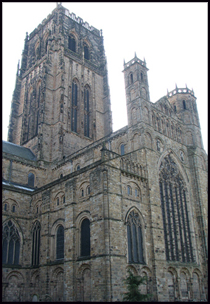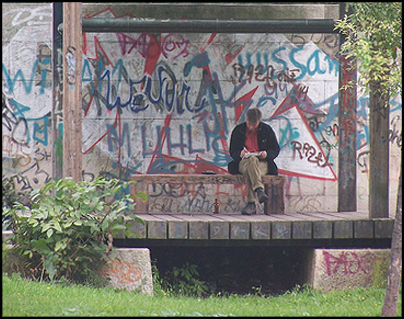 By PAT HARTMAN
By PAT HARTMAN
News Editor
If you’ve ever visited a place with literary associations and written about it — and, of course, taken pictures — this fabulous online resource wants you as one of its fabulous resources. Literary Locales is a directory that has already compiled more than 1,350 links to places associated with the lives and/or work of well-known authors. Here’s the invitation:
If you think that a deserving writer has been overlooked or treated inadequately, fetch your camera and set matters to right. We are constantly open to new additions. This site abounds with examples upon which you can model your own page. Or you can submit gifs or jpegs to us and we will construct a page for you.
You can’t ask for fairer than that! Literary Locales is sponsored by San Jose State University; specifically, by the Department of English & Comparative Literature. Its participatory nature guarantees a wide range of interests. Want to see Danielle Steel’s mansion in San Francisco? Or the village of Umuofia from Chinua Achebe’s novel Things Fall Apart? Present and accounted for. Dante’s birthplace in Florence, Italy? Check. The Greenwich Village apartment of John Dos Passos? It’s here. The birthplace of Gustave Flaubert or Helen Keller? No problem. Louveciennes, where Anais Nin hung out; Trieste, as experienced by Rilke; the Corfu of Gerald Durrell; Edgar Allen Poe’s cottage; Robinson Crusoe’s island. The world is just one big theme park of places inhabited or depicted by writers.
“Ah love, let us be true to one another…” Yes, that’s Matthew Arnold’s poem “Dover Beach”, and here’s a nice website all about Dover Beach. Remember The Prophet? Here’s Bsharri, the part of Lebanon where Kahlil Gibran lived. It’s official: when it comes to plotting serious literary travel adventures, this site is the go-to guy.
Of course, Durham Cathedral (see picture) is represented. Travel writer Bill Bryson, being the Chancellor of nearby Durham University and President of the Campaign to Protect Rural England, has a particular fondness for the old pile. Its most salient literary feature is the tomb of the historian known as the Venerable Bede. He died in 735 and no, there isn’t a numeral missing from that year. One of the folks interred there is Cyril Argentine Alington, headmaster of Eton College and author of more than 50 books. Sir Walter Scott said of the edifice, “This view is unsurpassed in England”
Grand old Durham Cathedral has made the news, we learn from Mark Tallentire, staff writer for The Northern Echo, by quickly acquiring more Facebook fans than any other cathedral in England. The people who made it so are justifiably proud, but there is one little thing… This piece doesn’t mention that cathedral’s current vogue just might be due to its presence in the Harry Potter movies, in the guise of Hogwarts School of Witchcraft and Wizardry.
A bit of bad news in the literary tourism realm is the threat to the Muromtsev Dacha, part of the Tsaritsyno park complex in Moscow. This big old house was taken over by the national government when Russia had a revolution, but four years ago ownership was transferred to the city, and what’s been happening since then is not pretty. Ksenia Galouchko reveals what and why in The Moscow Times.
The building is threatened with demolition, which is no good for the six families in residence, some of whom have been there for decades. That’s bad enough, but there are literary associations with Ivan Bunin, a Nobel Prize winning writer, and with the poet Venedikt Yerofeyev who hung out there a lot in the ’70s and ’80s. Some of his notes are available for viewing. A cultural heritage organization has installed a memorial plaque honoring Yerofeyev and suggested turning the place into a museum, but that hasn’t seemed to help.
Here’s what we hope: that the Muromtsev Dacha will be preserved, and show up in the pages of Literary Locales, along with all the other places frequented by the literary greats.
Durham, aka Hogwarts photo courtesy of Glen Bowman , used under this Creative Commons license

